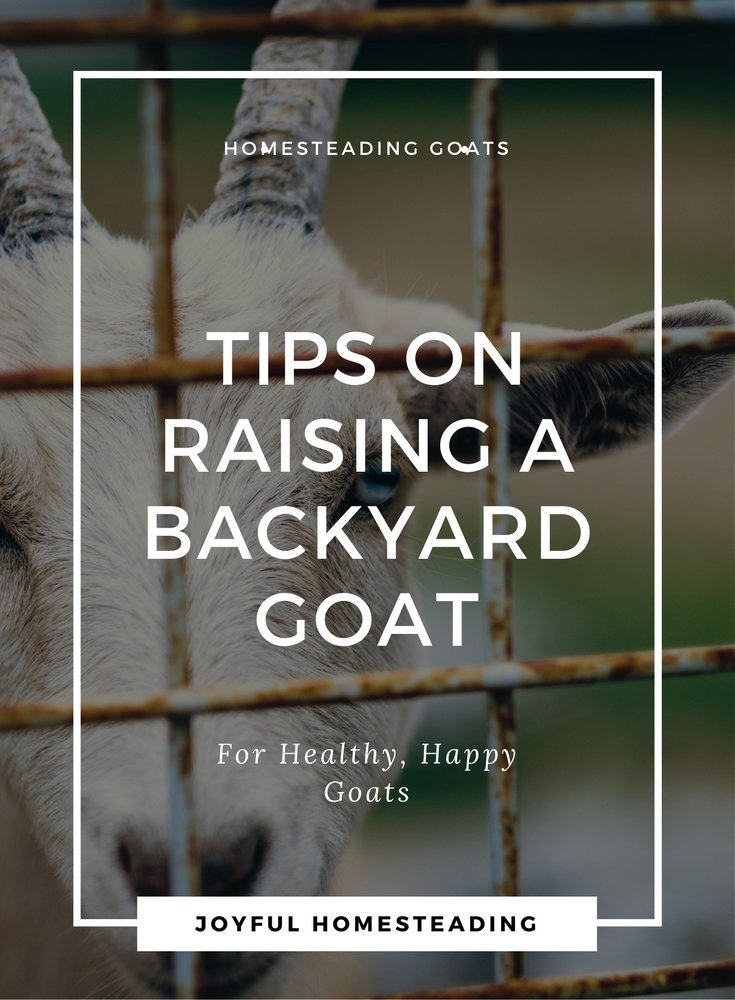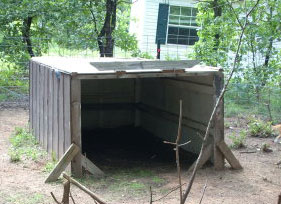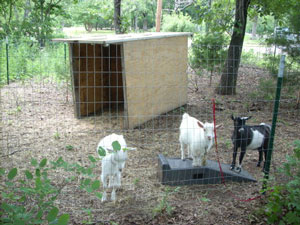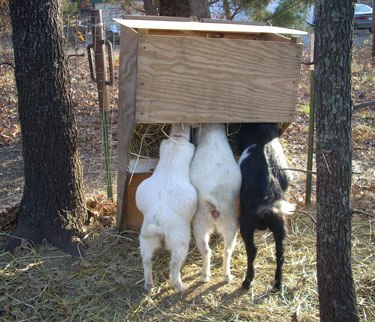How to Raise Goats in Your Backyard Farm or Homestead
How to raise goats? To take proper care of the goats in your backyard farm or homestead isn't rocket science, but it does take some preparation. These animals aren't as tough as some cartoons make them out to be. They will need some special attention, including proper shelter and the right food.
So follow these guidelines, and you'll be off to the right start, raising goats for milk, for meat and for great self sufficiency.

How to Raise Goats and Shelter
|
They will need some sort of shelter as they hate the rain and shouldn't
be out in it. |
 |
In fact, it's downright dangerous as goats can easily
become sick from standing out in the rain.
So be sure to provide
them with at least three walls and a roof. Protection from wind and rain
is one of the best ways you can care for your goats.
If you have a smaller animal, such as a Nigerian dwarf, even a dog house or igloo dog house will do.
Dirt floors are fine, and many people prefer them. Your goat's excess urine will soak into the ground, and you will need less bedding, hence easier care. And if your goats do suffer stress, there are a number of natural treatments you can give them to calm them and strengthen their immune systems.
Probiotics are a good idea not only for humans, but your goats as well. They replace the harmful bacteria in the gut with good bacteria that will fight illness and strengthen the immune system. You can find a goat probiotic here. To help calm your goats, add Bachs Rescue Remedy to their water on a regular basis. There are no harmful side effects to either of these products, and they are both nonaddictive.
How to Raise Goats
Do Fence Them In
|
Roy Rogers might have balked at the notion of being fenced in, but a
sturdy pen is crucial for the safety and good care of your precious
animals. |
 |
Stock paneling is probably the best - and most cost-effective method of keeping goats in a smaller area. These panels are easy to install and move.
Do not use field fence with larger breeds as it's too stretchy. Your nubian will lean against it and stand on the wire until it sags so badly she can walk right over it.
If you have a large area to enclose and must use field fence, then also include electric wiring to discourage your large buck from standing on it and ruining it. However, for smaller goats, such as pygmies or Nigerian dwarves, a better-quality welded wire fencing should work fine.
If you do have a goat that keeps trying to escape, your critter may have a salt deficiency and is looking for something to compensate. You can get a salt lick from your farmer supply store. Just keep it away from the water supply.
How to Raise Goats and
What To Feed Them
A big tip on how to raise goats is to feed them primarily hay. Hay is made of grasses or legumes that have been cut at an early stage of their development and allowed to dry in the sun. It should be green in color and be grass grown specifically for feed, such as orchard grass, alfalfa and timothy grass.
The quality of the hay is determined by how it is cured in the field. If it rains while the hay is drying, then it loses its nutritional value and could mold. But on the other hand, if the hay gets too dry, the nutrition will be shattered and lost during the baling process.
The best hay for goat care is alfalfa or clover hay because it has a high level of protein and calcium. However, don't feed white clover as it is poisonous.
How to Raise Goats
Straw for Bedding Only
Straw, on the other hand, is the leftover remnants of grain after it has been combined - the dried leaves and stems of barley, oats and wheat.
Straw is golden colored and is used for bedding and never for food.
Add a Little Grain
You should also feed your goats a concentrated ration of grain every day to make certain they get needed vitamins and minerals.
Goats will not eat feed that has been ground to the dust, so provide them with cracked or even whole grains as well, including barley, buckwheat, corn, oats and soybeans. Also, a good feed will have molasses in it to make it taste better and provide an important source of iron.
How to Raise Goats and
the Feed Manger
|
Never just throw hay on the ground, as this could lead to parasites.
Plus many goats never eat anything that has fallen to the ground. |
 |
Instead, provide hay in a manger. Place it high enough so they can't jump into it and contaminate the hay.
How to Raise Goats and
Take Care of Their Hooves
You need to trim your finger and toenails periodically, or you'll have trouble walking and using your hands. Likewise, to properly care for your goats, you will need to trim your their hooves every 2-3 months. If you don't, it could eventually cripple them.
You will especially need to do this if your animals spend all their time walking on the soft ground. To increase time between trimmings, place ten to twelve rough cinder blocks in the pen with the holes turned to the side. It will provide both filing and entertainment!
Use either pruning shears or goat hoof trimmers.







New! Comments
Have your say about what you just read! Leave me a comment in the box below.